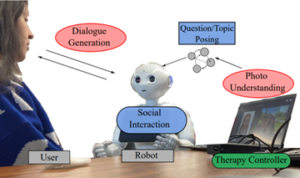Participatory Design for Human-Robot Interaction in Dementia Reminiscence Therapy.

ENRICHEnabling Research in Care Homes
GUEST BLOG
Participatory Design for Human-Robot Interaction in Dementia Reminiscence Therapy.
Nathalia Céspedes Gómez is a PhD student at the Queen Mary University of London (UK) in the Human Augmentation and Interactive Robotics team. She graduated as a Biomedical Engineer from the Colombian School of Engineering Julio Garavito and received a master degree in Electronics Engineering from the same university. Her work is focused on building human-robot interfaces for rehabilitation scenarios and developing techniques to improve the interaction with users. Currently, her research involves the development of conversational social agents for people living with dementia
In this blog I will introduce a research study aimed at involving health care and social care staff in the design of a novel tool to support people living with dementia. Social robotics can be a great tool to support different healthcare scenarios. For instance, social robots are being used in Dementia Reminiscence Therapy (RT) to improve the quality of life and social skills of people living with dementia. Currently, we are developing a human-robot interface to tackle the needs of this population through conversational methods and cognitive robotics. To build this tool, we believe that integrating the stakeholders of the project (healthcare and social care staff) is essential to increase engagement and promote adherence to the tool. Hence, we are looking for clinicians working in Dementia who want to take part in a Participatory Design Study (PDS). The study will be carried out in two different phases and there will be compensation for the collaboration. We expect to understand the needs of the stakeholders, and therefore, improve the application.

According to the World Health Organization, around 50 million people worldwide have dementia. Dementia is one of the major causes of disability and requires treatments that optimize physical and cognitive conditions during the long term. As a consequence of the dementia population growth, several researchers propose the development of new strategies, to reduce negative symptoms (e.g., agitation, depression), promote social interaction, improve patient’s physiological/cognitive status, increase engagement and support clinician’s work.
Therefore, this project aims to support people living with dementia, health care and social care staff by employing novel tools. Specifically, our project will introduce a technological tool for Reminiscence Therapy (RT). RT is one of the most popular psychosocial interventions used in dementia. This therapy was introduced in 1980, and it is based on the evocation of past events using nostalgic materials (e.g., photos, music, videos). This treatment is based on the premise that remote memory maintains intact until the later stages of dementia, and is used as a way of communication with people living with dementia. Several studies have demonstrated that RT positively impacts the cognitive process, decreases depression symptoms and increases the patient’s adaptation to the present time and life satisfaction.
In this context, our project integrates a social robot that will interact with people living with dementia during RT (as the one you can see in the Figure). An RT session with the robot will start with the analysis of the patient’s photos. For instance, if a patient provides a photo with people in it, the robot will analyze the presence and the number of the people. Then, will pose some questions to recall the memory of the people living with dementia (these questions are commonly used in RT and allow the patient to think deeply about the moment lived when the photo was taken).

Although the Human-robot interface is a potential tool to aid people living with dementia. The support of health care and social care staff is indispensable for building this kind of tool. The experience and the knowledge of the ones who interact daily with the people living with dementia add a significant plus to the technology. Consequently, a Participatory Design Study will be carried out to integrate the possible stakeholders of this project to co-design the interface. On the one hand, you will learn more about this technology. On the other hand, you will share your thoughts and ideas to improve the interaction with both, people living with dementia and healthcare professionals.
The study will be divided into two phases:
- Introductory Phase: This phase consists of 1-hour session, where you will be introduced to the Reminiscence Therapy Technology (Overall Perspective) and how the outcomes are affecting people living with Dementia. After the presentation, we will perform a questionnaire to measure the initial perception of this type of tool.
- Understanding/Creating Phase: This phase consists of 2-hour sessions. First, you will be able to test and interact with the current setup. Second, we will explain the limitations and the advantages of the interface, to extend the comprehension of this tool. Finally, we will organize some Focus-groups to extract some ideas (changing the robot’s behaviours, dialogues, interface etc.) to improve the interface.
You will receive compensation for participating in each phase of the study. The Introductory Phase will be run as an Online session, and you will receive £35 per hour. The Understanding/Creating Phase will be run at the Queen Mary University of London and you will receive £45 per hour.
We expect that the outcomes of this study will contribute to understanding the needs that Dementia stakeholders could have. Furthermore, improve the development of the Human-robot interface in order to create a comprehensive tool and increase the adherence to this type of technology.
To participate in the study, please contact Nathalia Cespedes (email: n.cespedesgomez@qmul.ac.uk).
Researchers involved in the study:
Dr Janelle Jones is a Senior Lecturer in Social Psychology and Director of the WELL lab at Queen Mary University of London (QMUL).
Dr. Anne Hsu is a computer science lecturer at Queen Mary, University of London in the Risk and Information Management Group, and specialist advisor to Magpar on AI-related financial investments.
Dr Ildar Farkhatdinov is a Senior Lecturer in Robotics at Queen Mary University of London.